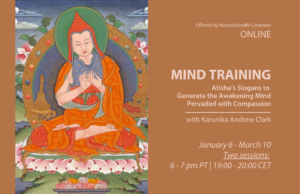When I was younger, an elderly gentleman kept telling me that I needed to take responsibility. The first few times, I was slightly disturbed by it and wondered why he was repeatedly insisting I take responsibility. Was I not doing well?
Eventually, I realized that he simply liked talking about taking responsibility. I was just a way for him to talk about one of his favorite topics, something that had helped in his own life. I started to notice that all he really wanted was for me to do well in this life. His motivation was love and kindness!
I soon went from being slightly uncomfortable around this person, to appreciating the loving mind he showed me whenever he talked about how awesome it is to take responsibility.
When we practice listening to what others have to say, when we truly hear them, there are fewer rambling thoughts coming from our own mind. When we hear what someone is saying before we put our own thoughts on it, our mind settles down into a receptive and peaceful space.
Within this peaceful state, we can notice the motivations behind someone’s words better. What they actually are trying to share becomes clear. In my experience, silent listening is one of the keys to overcoming a pessimistic mind, this mind that complains and sees faults everywhere.
A pessimistic mind usually is based on our thoughts becoming solidified through repetition. But when we shift our focus from our own repeating thoughts and start to listen, we begin to see that our thoughts are not the full story.
Through the power of listening, we begin to appreciate that others have wisdom to share. Although their form of expression may be awkward, people have positive motivations all the time. If we allow ourselves to notice those expressions of wisdom, the world will seem less dark. And then, when it’s our turn to speak, our speech will have some power because of the clarity and calmness of our mind.
Others’ speech is worth cherishing. Listening well to community members shows us that the world is only as dark as our emphasis on faults. Our focus on problems and complaints is not the whole story anymore, which makes a big difference in our mind.
Contemplation
Practice listening before speaking. Try short sessions at first.
You can set the intention to listen in connection with a certain person, or a time of day, or even a room. You could decide: every time I turn my attention toward this person, I will take a minute to listen before speaking. Or you could say: every morning at breakfast, I will emphasize listening. Or, every time I enter a Zoom meeting, I will listen for a few minutes before I share what is on my mind.
Try one of these examples (or your own) for a week. Notice what happens to your mind when you are receptive and listen.

Christian Scott has been a student of Dzogchen Ponlop Rinpoche since 2011. Having grown up among the Khenpo Tsültrim Gyamtso Rinpoche sangha, Christian finds himself humming Milarepa´s Songs of Realization regularly. Since 2012, he has been traveling around the world learning Tibetan as well as studying and meditating on the dharma.






